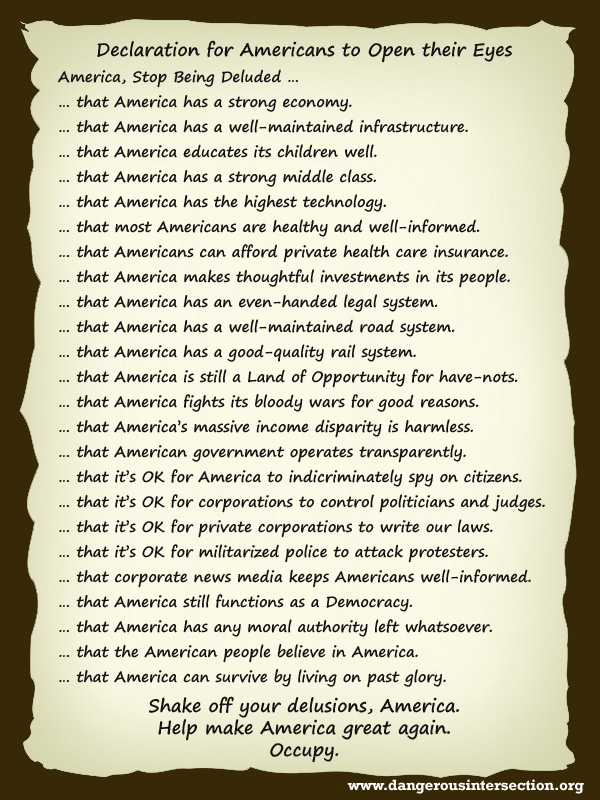Yesterday afternoon, a friend mentioned that in his experience people are usually embarrassed to be exposed as illiterate, but they don't seem to care whether they are exposed as mathematically incompetent. That observation resonated with me. In fact, not only aren't people embarrassed about being mathematically incompetent, but many people seem proud of being mathematically illiterate. They use their mathematical incompetence to socially bond with other people who are mathematically incompetent. More than a few times, someone in the room has mentioned that they're not very good with numbers and several other people in the room immediately come to their rescue indicating that it's okay to be mathematically incompetent because they too struggled with mathematics.
I don't think it's any coincidence that American students are so deficient at mathematics compared to the students in many other countries while, at the same time, Americans have such bizarre public policy priorities (e.g., a zero tolerance policy toward terrorism at the same time that thousands of Americans are dying needlessly of treatable medical conditions and while millions of American children are subjected to terribly underfunded schools that will ruin their lives).
After yesterday's conversation, I pulled out an 1988 book by John Allen Paulos, Innumeracy: Mathematical Illiteracy and Its Consequences. here's what Paulos has to say right in his introduction:
Innumeracy, an inability to deal comfortably with the fundamental notions of number and chance, plagues far too many otherwise knowledgeable citizens. The same people who cringe when words such as "imply" and "infer" are confused react without a trace of embarrassment to even the most egregious of numerical solecisms. I remember once listening to someone at a party drone on about the difference between "continually" and "continuously." Later that evening we were watching the news, and the TV weather forecaster announced that there was a 50% chance of rain for Saturday and a 50% chance for Sunday, and concluded that there was therefore a 100% chance of rain that weekend. The remark went right by the self-styled grammarian, and even after I explained the mistake to him, he wasn't nearly as indignant as he would've been had the weathercaster left a dangling participle. In fact, unlike other failings which are hidden, mathematical illiteracy is often flaunted: "I can't even balance my checkbook." "I'm a people person, not a numbers person." Or "I always hated math."
Paulos suggests that part of the reason for this ignorance of mathematics is that the consequences are often not as obvious as those of other weaknesses. On the other hand, the problems caused by innumeracy are serious, often times matters of life and death. Paulos lists the following examples:
Stock scams, choice of a spouse, newspaper psychics, diet and medical claims, the risk of terrorism, astrology, sports records, elections, sex discrimination, UFOs, insurance and law, psychoanalysis, parapsychology, lotteries, and drug testing…
Why do people struggle so much with mathematics? Paulos points to natural psychological responses to uncertainty, to coincidence, and how problems are framed, as well as anxiety, romantic misconceptions about nature and the importance of mathematics. One of the biggest consequences of innumeracy are "unfounded and crippling anxieties" and "impossible and economically paralyzing demands for risk-free guarantees." Paulos mentions that politicians are rarely helpful, because they are often "loathe to clarify the likely hazards and trade-offs associated with almost any policy."
It's been a while since I read
Innumeracy, but I highly recommend it. It is a timeless book filled with examples to remind us of the importance of a precise understanding of mathematics. Paulos indicates, "The book will have been well worth the effort if it can begin to clarify just how much innumeracy pervades both our private and/or public lives."
By the way, if you know someone who is struggling with mathematics, Paulos book is a good place to start. He is an excellent teacher of math as well as a clear writer. If you know someone who wants to understand basic math, refer them to the
many free video lessons at Khan Academy.
Once we master math, I would suggest that we turn to biology. It is my firm belief that all of us would be much better off with an understand of human beings based on the understanding that humans are human animals.

